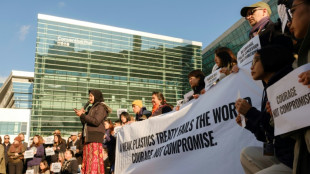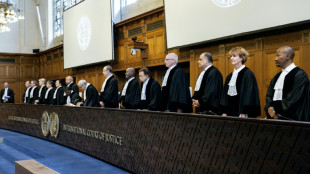
-
 Toll in Syria jihadist-army fighting rises to 242: monitor
Toll in Syria jihadist-army fighting rises to 242: monitor
-
UK transport secretary quits in setback for Starmer

-
 Days before deadline, plastic treaty draft highlights disagreement
Days before deadline, plastic treaty draft highlights disagreement
-
Crypto boss eats banana art he bought for $6.2 million

-
 Teen news boss criticises Australian social media ban
Teen news boss criticises Australian social media ban
-
Taiwan detects 41 Chinese military aircraft, ships ahead of Lai US stopover

-
 Spain urged to 'build differently' after deadly floods
Spain urged to 'build differently' after deadly floods
-
WTO chief faces heavy task as Trump threat looms

-
 Herbert takes control at Australian Open as Smith tanks
Herbert takes control at Australian Open as Smith tanks
-
Israel PM again warns Iran after top diplomat talks of revising nuclear doctrine

-
 Brilliant Brook's 132 puts England on top against sloppy New Zealand
Brilliant Brook's 132 puts England on top against sloppy New Zealand
-
Brilliant Brook's 132 puts England on top against New Zealand

-
 US landmine offer to Ukraine throws global treaty into 'crisis': campaign group
US landmine offer to Ukraine throws global treaty into 'crisis': campaign group
-
Singapore hangs 4th person in three weeks

-
 Five things to know about NewJeans' shock split from agency
Five things to know about NewJeans' shock split from agency
-
Waste pickers battle for recognition at plastic treaty talks

-
 Ireland votes in closely fought general election
Ireland votes in closely fought general election
-
Top UN court to open unprecedented climate hearings

-
 European countries that allow assisted dying
European countries that allow assisted dying
-
British MPs to debate contentious assisted dying law

-
 Schmidt not expecting hero's welcome on Ireland return
Schmidt not expecting hero's welcome on Ireland return
-
PSG stuck between domestic dominance and Champions League woes

-
 'Hot fight' as unbeaten Bayern visit Dortmund fortress
'Hot fight' as unbeaten Bayern visit Dortmund fortress
-
Bordeaux-Begles' Samu 'not finished yet' with Wallabies

-
 Brook and Pope half-centuries haul England to 174-4 against NZ
Brook and Pope half-centuries haul England to 174-4 against NZ
-
Yen rallies on rate hike bets as equity markets swing

-
 Ukraine superstar Mahuchikh brings 'good vibes' to her war-torn country
Ukraine superstar Mahuchikh brings 'good vibes' to her war-torn country
-
PlayStation at 30: How Sony's grey box conquered gaming

-
 Saudi Arabia hosts UN talks on drought, desertification
Saudi Arabia hosts UN talks on drought, desertification
-
PlayStation: Fun facts to know as Sony's console turns 30

-
 Nepal's first transgender candidates run for local office
Nepal's first transgender candidates run for local office
-
Father of PlayStation says 'everyone told us we would fail'

-
 Ireland seek to overcome former coach Schmidt's Wallabies
Ireland seek to overcome former coach Schmidt's Wallabies
-
Detroit survive Bears comeback to make it 10 wins in a row

-
 Mexican actor Silvia Pinal dead at 93
Mexican actor Silvia Pinal dead at 93
-
'Black Friday' deals target inflation-weary US consumers

-
 Liverpool look to deepen Man City crisis, Amorim seeks first Premier League win
Liverpool look to deepen Man City crisis, Amorim seeks first Premier League win
-
Police fire rubber bullets, tear gas at Georgia protesters after PM delays EU bid

-
 England lose three quick wickets in reply to New Zealand's 348
England lose three quick wickets in reply to New Zealand's 348
-
Social media companies slam Australia's under-16 ban

-
 Police fire tear gas at Georgia protesters after PM delays EU bid
Police fire tear gas at Georgia protesters after PM delays EU bid
-
Canada watchdog sues Google over 'anti-competitive' ad tech

-
 Hojlund gives Amorim winning Old Trafford bow, Roma hold Spurs
Hojlund gives Amorim winning Old Trafford bow, Roma hold Spurs
-
Amorim wins first Man Utd home game after rollercoaster ride

-
 France arrests 26 as South Asian migrant trafficking ring smashed
France arrests 26 as South Asian migrant trafficking ring smashed
-
At least 15 dead, 113 missing, in Uganda landslides

-
 Netanyahu threatens 'intensive war' if Hezbollah breaches fragile truce
Netanyahu threatens 'intensive war' if Hezbollah breaches fragile truce
-
Bilbao join Lazio at Europa League summit, Chelsea cruise in Conference League

-
 In Lebanon's Tyre returning residents find no water, little power
In Lebanon's Tyre returning residents find no water, little power
-
Protests in Georgia after PM delays EU bid to 2028


Israel PM again warns Iran after top diplomat talks of revising nuclear doctrine
Prime Minister Benjamin Netanyahu said Thursday that Israel would do "everything" to stop Iran acquiring a nuclear weapon after Iran's top diplomat warned it could end its ban on developing one if Western sanctions are reimposed.
The renewed war of words between the Middle East foes came as Iran prepares to hold key nuclear talks with European governments on Friday which have been overshadowed by their joining with Washington to have Tehran censured by the UN atomic watchdog.
"I will do everything to prevent it from becoming a nuclear (power), I will use all the resources that can be used," Netanyahu told Israeli broadcaster Channel 14 in an interview.
Israel is the region's sole, if undeclared, nuclear-armed state. It has long made preventing any rival from matching it its top defence priority.
Netanyahu said Tuesday that the ceasefire that went into effect in Lebanon the following day would allow Israel to focus on Iran. He did not elaborate on what action he envisaged.
Iran launched two missile barrages at Israel over the past year in retaliation for the killing of leaders from Hamas and Hezbollah, as well as an Iranian general.
Israel responded both times with limited attacks on Iran, most recently bombing several military sites on October 26.
Last week's chiding at the International Atomic Energy Agency prompted a defiant response from Tehran, but its officials have since signalled willingness to engage with others ahead of the return of US president-elect Donald Trump, whose last administration pursued a policy of "maximum pressure" against Iran.
- Current doctrine 'insufficient' -
Iran insists on its right to nuclear energy for peaceful purposes, but according to the IAEA, it is the only non-nuclear-weapon state enriching uranium to 60 percent.
In an interview with The Guardian newspaper, published on the eve of Iran's talks with Britain, France and Germany, Foreign Minister Abbas Araghchi warned that frustration in Tehran over unmet commitments, such as lifting sanctions, was fuelling debate over whether the country should alter its nuclear policy.
"We have no intention to go further than 60 percent for the time being, and this is our determination right now," he told the British daily.
But, he added, "there is this debate going on in Iran, and mostly among the elites... whether we should change our nuclear doctrine" as so far it has proven to be "insufficient in practice".
A 2015 nuclear deal between Tehran and major powers aimed to give Iran relief from crippling Western sanctions in exchange for limiting its nuclear programme to prevent it from developing a weapons capability.
Tehran has consistently denied any such ambition. Supreme leader Ayatollah Ali Khamenei, who has the final authority in Iran's decision-making, has issued a religious decree, or fatwa, prohibiting atomic weapons.
Tehran's willingness to sit down with the three European governments so soon after the censure comes just weeks before Trump is set to return to the White House.
During his first term, Trump focused on reimposing heavy sanctions on Iran following his administration's unilateral withdrawal from the 2015 deal three years after it was agreed.
In retaliation for the US withdrawal, Tehran reduced its compliance with the deal, raising its uranium enrichment levels to 60 percent -- closer to the 90 percent required for a nuclear bomb.
- 'Frank exchange' -
Under the 2015 accord -- which will expire in October 2025 -- Iran's enrichment was capped at 3.67 percent.
Iranian diplomat Majid Takht-Ravanchi, who serves as the political deputy to Araghchi, is scheduled to represent Iran in Friday's talks.
On Thursday he and deputy foreign minister for legal and international affairs Kazem Gharibabadi met with Enrique Mora, deputy secretary general of the European Union's foreign affairs arm.
Mora said on X that they held a "frank exchange... on Iran's military support to Russia that has to stop, the nuclear issue that needs a diplomatic solution, regional tensions (important to avoid further escalation from all sides) and human rights".
Last week, the 35-nation board of governors of the IAEA adopted a resolution proposed by Britain, France, Germany and the United States condemning Iran for its lack of cooperation on nuclear issues.
Iran described the move as "politically motivated" and in response announced the launch of "new advanced centrifuges" designed to increase its stockpile of enriched uranium.
For Tehran, the goal of the talks on Friday is to avoid a "double disaster" scenario, in which it would face renewed pressures from both Trump and European governments, according to political analyst Mostafa Shirmohammadi.
He noted that Iran's support among European governments had been eroded by allegations it offered military assistance for Russia's invasion of Ukraine.
Iran has denied these accusations and hopes to mend relations with Europe, while also maintaining a firm stance.
M.Ouellet--BTB
